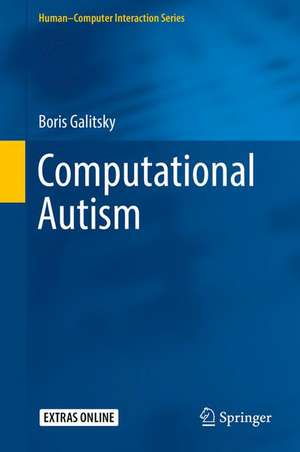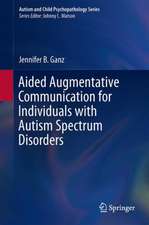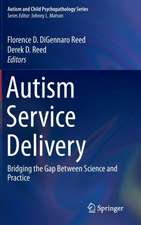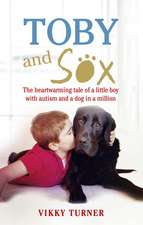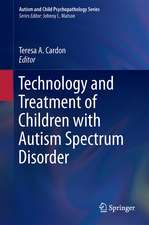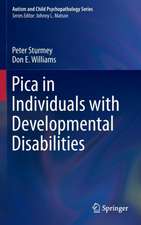Computational Autism: Human–Computer Interaction Series
Autor Boris Galitskyen Limba Engleză Hardback – 17 oct 2016
The author subjects the Theory of Mind (ToM) model to a formal analysis to investigate the limitations of autistic reasoning and proposes a formal model regarding mental attitudes and proposes a method to help those with autism navigate everyday living. Based on the concept of playing with computer based mental simulators, the NL_MAMS, is examined to see whether it is capable of modeling mental and emotional states of the real world to aid the emotional development of autistic children. Multiple autistic theories and strategies are also examined for possible computational cross-overs, providing researchers with a wide range of examples, tools and detailed case studies to work from.
Computational Autism will be an essential read to behavioral specialists, researcher’s, developers and designers who are interested in understanding and tackling the increasing prevalence of autism within modern society today.
| Toate formatele și edițiile | Preț | Express |
|---|---|---|
| Paperback (1) | 650.27 lei 6-8 săpt. | |
| Springer International Publishing – 16 iun 2018 | 650.27 lei 6-8 săpt. | |
| Hardback (1) | 656.69 lei 6-8 săpt. | |
| Springer International Publishing – 17 oct 2016 | 656.69 lei 6-8 săpt. |
Din seria Human–Computer Interaction Series
- 20%
 Preț: 655.85 lei
Preț: 655.85 lei - 20%
 Preț: 309.25 lei
Preț: 309.25 lei - 20%
 Preț: 375.54 lei
Preț: 375.54 lei - 20%
 Preț: 644.48 lei
Preț: 644.48 lei - 20%
 Preț: 667.75 lei
Preț: 667.75 lei - 20%
 Preț: 664.44 lei
Preț: 664.44 lei - 20%
 Preț: 1164.84 lei
Preț: 1164.84 lei - 20%
 Preț: 817.55 lei
Preț: 817.55 lei - 20%
 Preț: 657.16 lei
Preț: 657.16 lei - 20%
 Preț: 645.31 lei
Preț: 645.31 lei - 20%
 Preț: 938.66 lei
Preț: 938.66 lei - 15%
 Preț: 658.05 lei
Preț: 658.05 lei - 20%
 Preț: 822.51 lei
Preț: 822.51 lei - 20%
 Preț: 654.21 lei
Preț: 654.21 lei - 20%
 Preț: 994.26 lei
Preț: 994.26 lei - 20%
 Preț: 1621.89 lei
Preț: 1621.89 lei - 20%
 Preț: 991.60 lei
Preț: 991.60 lei - 20%
 Preț: 783.45 lei
Preț: 783.45 lei - 20%
 Preț: 1175.42 lei
Preț: 1175.42 lei - 20%
 Preț: 659.97 lei
Preț: 659.97 lei - 20%
 Preț: 219.15 lei
Preț: 219.15 lei - 20%
 Preț: 334.86 lei
Preț: 334.86 lei - 20%
 Preț: 969.84 lei
Preț: 969.84 lei - 20%
 Preț: 642.19 lei
Preț: 642.19 lei - 20%
 Preț: 314.39 lei
Preț: 314.39 lei - 20%
 Preț: 661.14 lei
Preț: 661.14 lei - 20%
 Preț: 995.89 lei
Preț: 995.89 lei - 20%
 Preț: 752.58 lei
Preț: 752.58 lei - 20%
 Preț: 990.30 lei
Preț: 990.30 lei - 20%
 Preț: 990.12 lei
Preț: 990.12 lei - 20%
 Preț: 336.21 lei
Preț: 336.21 lei - 20%
 Preț: 334.71 lei
Preț: 334.71 lei - 20%
 Preț: 312.62 lei
Preț: 312.62 lei - 20%
 Preț: 994.92 lei
Preț: 994.92 lei - 20%
 Preț: 331.74 lei
Preț: 331.74 lei - 20%
 Preț: 646.80 lei
Preț: 646.80 lei - 20%
 Preț: 334.86 lei
Preț: 334.86 lei - 20%
 Preț: 994.40 lei
Preț: 994.40 lei - 20%
 Preț: 329.76 lei
Preț: 329.76 lei - 20%
 Preț: 332.24 lei
Preț: 332.24 lei - 20%
 Preț: 992.11 lei
Preț: 992.11 lei - 20%
 Preț: 650.40 lei
Preț: 650.40 lei - 20%
 Preț: 337.00 lei
Preț: 337.00 lei - 20%
 Preț: 332.39 lei
Preț: 332.39 lei - 20%
 Preț: 1279.86 lei
Preț: 1279.86 lei - 15%
 Preț: 636.12 lei
Preț: 636.12 lei - 20%
 Preț: 336.67 lei
Preț: 336.67 lei - 20%
 Preț: 1000.70 lei
Preț: 1000.70 lei - 20%
 Preț: 645.14 lei
Preț: 645.14 lei
Preț: 656.69 lei
Preț vechi: 820.86 lei
-20% Nou
Puncte Express: 985
Preț estimativ în valută:
125.65€ • 131.55$ • 103.97£
125.65€ • 131.55$ • 103.97£
Carte tipărită la comandă
Livrare economică 05-19 aprilie
Preluare comenzi: 021 569.72.76
Specificații
ISBN-13: 9783319399713
ISBN-10: 3319399713
Pagini: 390
Ilustrații: XI, 380 p. 149 illus., 78 illus. in color.
Dimensiuni: 155 x 235 x 22 mm
Greutate: 0.73 kg
Ediția:1st ed. 2016
Editura: Springer International Publishing
Colecția Springer
Seria Human–Computer Interaction Series
Locul publicării:Cham, Switzerland
ISBN-10: 3319399713
Pagini: 390
Ilustrații: XI, 380 p. 149 illus., 78 illus. in color.
Dimensiuni: 155 x 235 x 22 mm
Greutate: 0.73 kg
Ediția:1st ed. 2016
Editura: Springer International Publishing
Colecția Springer
Seria Human–Computer Interaction Series
Locul publicării:Cham, Switzerland
Cuprins
Introduction.- Computational Models of Autism.- Intuitive Theory of Mind.- Formalizing Theory of Mind.- Theory of Mind Engine.- Reasoning Beyond the Mental World.- Autistic Learning and Cognition.- Rehabilitating Autistic Reasoning.-
Recenzii
Notă biografică
Textul de pe ultima copertă
This book explores and evaluates accounts and models of autistic reasoning and cognition from a computational standpoint. The author investigates the limitations and peculiarities of autistic reasoning and sets out a remediation strategy to be used by a wide range of psychologists and rehabilitation personnel and will also be appreciated by computer scientists who are interested in the practical implementation of reasoning.
The author subjects the Theory of Mind (ToM) model to a formal analysis to investigate the limitations of autistic reasoning and proposes a formal model regarding mental attitudes and proposes a method to help those with autism navigate everyday living. Based on the concept of playing with computer based mental simulators, the NL_MAMS, is examined to see whether it is capable of modeling mental and emotional states of the real world to aid the emotional development of autistic children. Multiple autistic theories and strategies are also examined for possible computational cross-overs, providing researchers with a wide range of examples, tools and detailed case studies to work from.
Computational Autism will be an essential read to behavioral specialists, researcher’s, developers and designers who are interested in understanding and tackling the increasing prevalence of autism within modern society today.
The author subjects the Theory of Mind (ToM) model to a formal analysis to investigate the limitations of autistic reasoning and proposes a formal model regarding mental attitudes and proposes a method to help those with autism navigate everyday living. Based on the concept of playing with computer based mental simulators, the NL_MAMS, is examined to see whether it is capable of modeling mental and emotional states of the real world to aid the emotional development of autistic children. Multiple autistic theories and strategies are also examined for possible computational cross-overs, providing researchers with a wide range of examples, tools and detailed case studies to work from.
Computational Autism will be an essential read to behavioral specialists, researcher’s, developers and designers who are interested in understanding and tackling the increasing prevalence of autism within modern society today.
Caracteristici
Offers a unified computational approach to autistic reasoning and learning Presents the NL_MAMS mental simulator to aid the mental reasoning and emotional development of autistic children Provides tools, exercises and detailed case studies for academics, researchers and educators alike Includes supplementary material: sn.pub/extras
